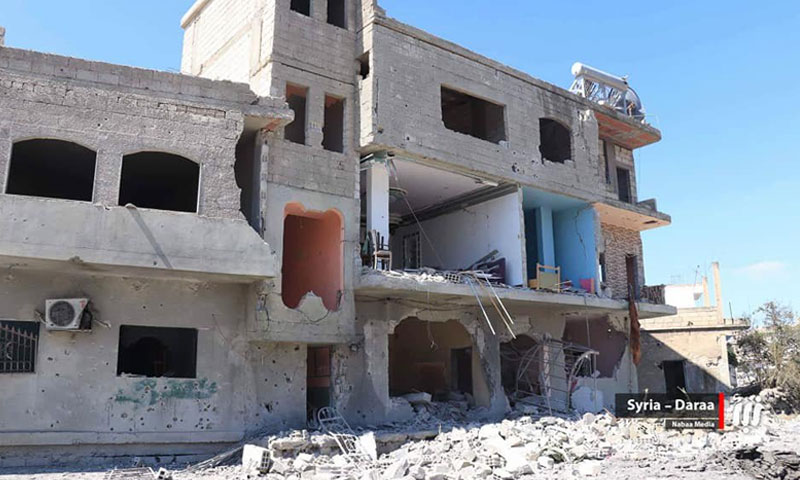



Now that a relative calm has overcome the towns in Daraa governorate, following the control of the Syrian regime, a number of the people started to restore their destroyed houses at their own expense, even if in a limited manner, sufficient only to protect them from cold and help them resist weather changes.
The people’s self-help projects came as a reaction to their lost hope in the reconstruction of the houses, damaged due to battles and the Syrian regime’s shelling that targeted the area, at a time where the government of the Syrian regime is applauding the return of safety and stability to the area.
This reconstruction movement, launched by the area’s families themselves, is taking place in several areas in Daraa governorate, including the Yarmouk Basin, the majority of the governorate’s rural parts, Daraa al-Balad, Ataman, al-Shaykh Maskin and Khirbet Ghazaleh, following the evacuation of camps such as Zayzon and al-Saaika (Strike) and the return of more than eight thousand displaced persons from these camps to their villages.
The governmental and the international effort in support of the people are lacking, which enhances their economic burdens under unemployment and lavish life expenses.
The reconstruction activities vary according to the people’s ability at affording the costs of restoration, who themselves have been clearing off the rubble of old buildings and doing the restoration process in a way that provide them with a shelter instead of the displacement camps, as Amjad, one of Ataman town’s people, has said.
Not all of the Ataman town’s people can afford to restore their houses, taking into consideration the weak financial status of the majority, especially in the shadow of the deteriorating economic situation in Syria, Amjad added telling Enab Baladi.
Upon interviewing several people, who returned to their homes in rural Daraa, expressions similar to “a tent here is better than displacement” were recurrent.
While the governmental efforts keep being absent, the “Syrian Red Crescent” organization is undertaking efforts of partial restoration of the governorate’s streets, such as road upgrading, maintenance of electricity networks and others.
The Orthodox Church has also offered a partial support to the destroyed houses’ owners in Daraa al-Balad for the removal of rubble, according to identical information that Enab Baladi managed to get.
The destroyed houses’ owners in Daraa al-Balad received a sum of 200 thousand Syrian pounds each, which is very little if compared to the costs of rubble removal, estimated at about three million Syrian pounds per house, as one of the Daraa al-Balad’s contractors has told Enab Baladi in an interview.
The contractor said that clearing off the rubble of the destroyed houses requires heavy machinery, bulldozers and trucks, that all cost a lot of money, which the simple funding the house owners have received cannot cover.
The funding is limited to the neighborhoods of the Daraa al-Balad, for various areas in Daraa governorate and other rural parts did not get any form of support because the international organizations have ceased functioning as the Syrian regime prevent them.
The low prices of the building materials helped the people restore their houses in a manner compatible with their financial resources. This helped alleviate part of the proliferating lavish expenses and encaged many people to start the restoration process of their houses.
The decrease in the prices of building materials started following the reopening of the principal roads between the two governorates of Daraa and Damascus, and the removal of the inspection checkpoints east of Da’el town, which used to impose passage fees on the trucks, in addition to the decrease of the fuel prices from 500 to 180 Syrian pounds.
“Following the reopening of the roads, the prices went low, accompanied by a marked decrease of costs, because [passage] was limited to the war road between Daraa and Sweida,” Ahmad al-Zoubi, the owner of a building material quarry, told Enab Baladi.
Anis Mohammad, a man working at a cement brick factory, confirmed this, as he observed an increasing demand on the purchase of building materials, bricks in particular, attributing this to the decreasing prices of sand, cement and fuel.
The price of a square meter of sand went low from 11500 to seven thousand Syrian pounds, while a cement bag, 50 kilograms, is sold for 2500 instead of 2800 Syrian pounds, in addition to the decrease of the brick’s price, for a singles brick is today purchased for 140 instead of 180 Syrian pounds.
One of Ataman town’s people, who refused to reveal his name for security reasons, told Enab Baladi that upon returning to the town last May, “the town did not look like the one we left at all, but it is exactly as we expected it to be, for the destruction scenes that befell the town are expected and the houses that survived are all stolen.”
“You can imagine how a house looks like before the coating process, all the furniture is stolen. The kitchens and bathrooms are dismantled and robbed. Even the electricity extensions and water pipes did not survive the thefts. In brief, the intact house needs reconstruction and refurnishing,” he added.
Current estimations indicate that about 40 families from the Ataman town managed to return and check on their homes, and this is a small number if compared to the town’s original population, which exceeded 1500 families.
Following Assad’s forces control over the Daraa governorate last July and the departure of the opposition factions under a dual deal, the people of Daraa who were displaced to several places started a gradual return after journey of displacement that took years and sometimes months.
if you think the article contain wrong information or you have additional details Send Correction